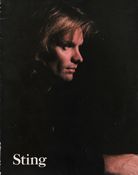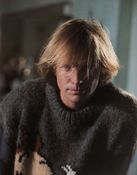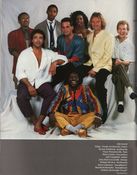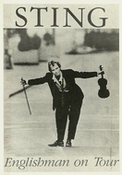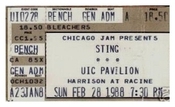
Nothing Like The Sun
Feb
28
1988
Chicago, IL, US
University of Illinois Pavillion
Powerful new band helps Sting swing...
Sting had the last laugh on one of his critics at the Pavilion last night.
He told the crowd that he had been watching television one day and heard one of his songs from his career with the Police described as ''written and performed by the devil.''
The Rev. Jimmy Swaggart, the one who was making the claim, hasn't much time for rock reviewing these days, while that ole debbil Sting has seen his musical brand of secular humanism reach an audience that extends well beyond pop's Top 40.
Actually, Sting gets the last laugh on most of his critics in concert. On album, he may frequently sound pompous or pedantic or smug, his songwriting leaden with self-importance.
But give him a band as brilliant as the one currently accompanying him, and give him an audience as enthusiastic as the Pavilion crowd, and there's no doubt that he really knows how to let loose in live performance.
Much has been made of Sting's attempts to forge new musical directions, in collaboration with some young musicians who boast impressive jazz credentials.
Even so, Sting's current music is more of an expansion of his approach with the Police than a departure from it. That band presented themselves from the start as pop internationalists, mixing rhythms and musical textures from Jamaica, Africa and points beyond into their accessible songcraft.
While it was obvious that Sting was intending to expand the perimeters of pop, transcend the usual categories, he was limited by both the three-man lineup of the Police and the demand for hit-single catchiness.
On his own, he has expanded the lineup to eight powerhouse players and has extended his musical horizons for a more mature blend of melody, improvisation and international influence.
Throughout the concert, saxophonist Branford Marsalis showed his mastery of the subtle art of complementing a vocalist. Pianist Kenny Kirkland offered consistently inventive improvisation without overstepping the bounds of the song format.
Bassist Tracy Wormworth and guitarist Jeff Campbell, the band's newest recruits, showed that they could hold their own among the more experienced players. Percussionist Mino Cinelu and drummer Marvin Smith provided talking drums and a wealth of other rhythmic underpinnings.
Highlights ranged from the melodic caress of 'Be Still My Beating Heart' - almost unlistenably precious on record but irresistible live - to a rhythm-charged medley of 'The Lazarus Heart' from Sting's new album and 'Too Much Information' from the Police days.
For those who could never get too much of Sting, a video camera captured his every pose.
For the rest of us, the music showed that Sting has plenty to offer beyond lyrical sanctimony, because sanctimony never swings like this.
(c) The Chicago Sun-Times by Don McLeese
Sting lets his performance answer blasts from critics...
If you've been following the music press lately, you've probably seen some of the debate raging around Sting, surprising not only for its suddenness but for its virulence. This current attempt to tear down an idol for whom we were recently erecting pedestals is puzzling and somewhat disturbing. It also seems even more surprising after seeing Sting and his band present their enormously absorbing, complex and entertaining concert Sunday at the University of Illinois-Chicago Pavilion.
Though not technically spectacular, with just the requisite smoke and tasteful lighting, the performance was a dramatic event.
Rarely in rock shows, too, can such a crisp, distortion-free sound be heard. Instead of the usual audio sludge, the mix made each instrument, and consequently, all of the hugely talented instrumentalists, stand out clearly and distinctly.
To single out a particular moment or specific player in the two-hour plus show that focused on material from Sting's latest record, '...Nothing Like the Sun' and included tunes from his first solo album and earlier work with the Police, would be a disservice to the rest. Suffice it to say that each player shone in their solo moments and together, with the agility and daring of high-wire artists, bounded through a diverse set that included the Gershwin-esque ballad 'Sister Moon', the rugged reggae of 'One World', the Latin-tinged 'They Dance Alone' and all-out rock on Jimi Hendrix's 'Little Wing'.
Only a small portion of this band's talent was revealed. Branford Marsalis, for example, certainly one of the hottest young musicians around, spent as much time banging a cowbell as he did playing the saxophone. But to imply that Sting shouldn't work with such players, as critics have, is absurd - as though performing with third-rate hacks would somehow be purer or better serve the audience and musicians.
Sting has been criticized, too, for the many influences that have been incorporated into his music. Should pop simply go over the same ground again and again? For that matter, if music had to remain free of other influences, rock would simply not exist. Sting's social and political concerns also have come under attack, ironically when his writing is becoming increasingly subtle. Meanwhile, other bands that stick with June-spoon (and cruder variations) lyrics go unmolested, and others, such as U2, are hailed for expressing similiar commitments and concerns.
Maybe it's merely a coincidence that Sting is most viciously attacked (one publication labeled a story ''Slapping Sting Around'') after creating a work he says is about the feminine side of the human psyche, an album that explores the fragility of life, emotional openness and the ultimate futility of violence.
Sting is no idol to be worshiped. Like the mistress of the Shakespeare sonnet that gives his latest album its name, his glories cannot compare to those of the sun, the snow, the coral or the rose. Like all mortals, he ''treads on the ground.'' But like that lady, he has a rare talent that false comparisons and expectations cannot deny.
(c) The Chicago Tribune by Chris Heim
Sting had the last laugh on one of his critics at the Pavilion last night.
He told the crowd that he had been watching television one day and heard one of his songs from his career with the Police described as ''written and performed by the devil.''
The Rev. Jimmy Swaggart, the one who was making the claim, hasn't much time for rock reviewing these days, while that ole debbil Sting has seen his musical brand of secular humanism reach an audience that extends well beyond pop's Top 40.
Actually, Sting gets the last laugh on most of his critics in concert. On album, he may frequently sound pompous or pedantic or smug, his songwriting leaden with self-importance.
But give him a band as brilliant as the one currently accompanying him, and give him an audience as enthusiastic as the Pavilion crowd, and there's no doubt that he really knows how to let loose in live performance.
Much has been made of Sting's attempts to forge new musical directions, in collaboration with some young musicians who boast impressive jazz credentials.
Even so, Sting's current music is more of an expansion of his approach with the Police than a departure from it. That band presented themselves from the start as pop internationalists, mixing rhythms and musical textures from Jamaica, Africa and points beyond into their accessible songcraft.
While it was obvious that Sting was intending to expand the perimeters of pop, transcend the usual categories, he was limited by both the three-man lineup of the Police and the demand for hit-single catchiness.
On his own, he has expanded the lineup to eight powerhouse players and has extended his musical horizons for a more mature blend of melody, improvisation and international influence.
Throughout the concert, saxophonist Branford Marsalis showed his mastery of the subtle art of complementing a vocalist. Pianist Kenny Kirkland offered consistently inventive improvisation without overstepping the bounds of the song format.
Bassist Tracy Wormworth and guitarist Jeff Campbell, the band's newest recruits, showed that they could hold their own among the more experienced players. Percussionist Mino Cinelu and drummer Marvin Smith provided talking drums and a wealth of other rhythmic underpinnings.
Highlights ranged from the melodic caress of 'Be Still My Beating Heart' - almost unlistenably precious on record but irresistible live - to a rhythm-charged medley of 'The Lazarus Heart' from Sting's new album and 'Too Much Information' from the Police days.
For those who could never get too much of Sting, a video camera captured his every pose.
For the rest of us, the music showed that Sting has plenty to offer beyond lyrical sanctimony, because sanctimony never swings like this.
(c) The Chicago Sun-Times by Don McLeese
Sting lets his performance answer blasts from critics...
If you've been following the music press lately, you've probably seen some of the debate raging around Sting, surprising not only for its suddenness but for its virulence. This current attempt to tear down an idol for whom we were recently erecting pedestals is puzzling and somewhat disturbing. It also seems even more surprising after seeing Sting and his band present their enormously absorbing, complex and entertaining concert Sunday at the University of Illinois-Chicago Pavilion.
Though not technically spectacular, with just the requisite smoke and tasteful lighting, the performance was a dramatic event.
Rarely in rock shows, too, can such a crisp, distortion-free sound be heard. Instead of the usual audio sludge, the mix made each instrument, and consequently, all of the hugely talented instrumentalists, stand out clearly and distinctly.
To single out a particular moment or specific player in the two-hour plus show that focused on material from Sting's latest record, '...Nothing Like the Sun' and included tunes from his first solo album and earlier work with the Police, would be a disservice to the rest. Suffice it to say that each player shone in their solo moments and together, with the agility and daring of high-wire artists, bounded through a diverse set that included the Gershwin-esque ballad 'Sister Moon', the rugged reggae of 'One World', the Latin-tinged 'They Dance Alone' and all-out rock on Jimi Hendrix's 'Little Wing'.
Only a small portion of this band's talent was revealed. Branford Marsalis, for example, certainly one of the hottest young musicians around, spent as much time banging a cowbell as he did playing the saxophone. But to imply that Sting shouldn't work with such players, as critics have, is absurd - as though performing with third-rate hacks would somehow be purer or better serve the audience and musicians.
Sting has been criticized, too, for the many influences that have been incorporated into his music. Should pop simply go over the same ground again and again? For that matter, if music had to remain free of other influences, rock would simply not exist. Sting's social and political concerns also have come under attack, ironically when his writing is becoming increasingly subtle. Meanwhile, other bands that stick with June-spoon (and cruder variations) lyrics go unmolested, and others, such as U2, are hailed for expressing similiar commitments and concerns.
Maybe it's merely a coincidence that Sting is most viciously attacked (one publication labeled a story ''Slapping Sting Around'') after creating a work he says is about the feminine side of the human psyche, an album that explores the fragility of life, emotional openness and the ultimate futility of violence.
Sting is no idol to be worshiped. Like the mistress of the Shakespeare sonnet that gives his latest album its name, his glories cannot compare to those of the sun, the snow, the coral or the rose. Like all mortals, he ''treads on the ground.'' But like that lady, he has a rare talent that false comparisons and expectations cannot deny.
(c) The Chicago Tribune by Chris Heim



